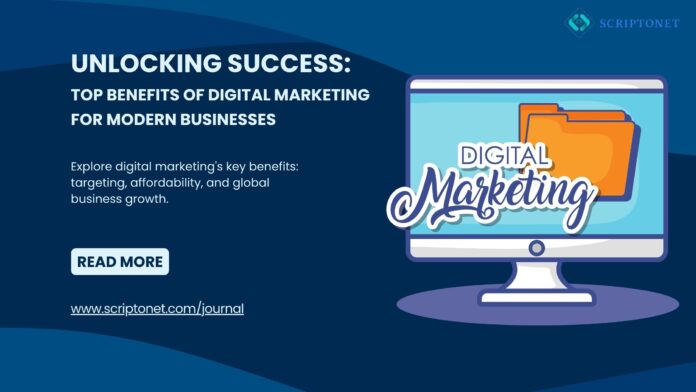Introduction
Digital marketing encompasses the use of online channels to promote or market products & services to consumers & businesses. The benefits of digital marketing are that it leverages various digital platforms, including search engines, social media, email & websites, to connect with target audiences. This approach allows for precise targeting, measurable results & interactive engagement, offering a dynamic alternative to traditional marketing methods.
Essentially, digital marketing involves crafting & implementing strategies that utilize digital tools & technologies to build brand awareness, generate leads & drive sales. It’s about understanding customer behaviour in the online sphere & adapting marketing efforts to meet their needs & preferences. This includes techniques like Search Engine Optimisation (SEO), Content Marketing, Social Media Marketing (SMM) & Pay-Per-Click (PPC) advertising, all working together to create a cohesive online presence & achieve marketing objectives.
Advantages of digital marketing
Digital marketing’s ability to target audiences precisely is one of its main benefits. Unlike traditional marketing, which often relies on broad demographics, digital platforms allow marketers to pinpoint specific audiences based on factors like age, location, interests & online behaviour. This ensures that marketing efforts reach the most relevant individuals, maximising the return on investment & minimising wasted resources. Furthermore, digital marketing’s unmatched measurability is one of its main advantages. By using analytics tools, marketers can monitor the effectiveness of their campaigns in real time and learn about important indicators like website traffic, conversion rates, and consumer engagement. This data-driven approach allows for continuous optimisation & refinement of marketing strategies, leading to improved results over time.
Another significant benefit is the cost-effectiveness of digital marketing. Compared to traditional advertising, which can be expensive & require substantial upfront investments, digital marketing offers a range of affordable options. Social media advertising, email marketing & content creation, for example, can be implemented with relatively low budgets, making them accessible to businesses of all sizes. This democratisation of marketing allows Small & Medium-Sized Enterprises (SMEs) to compete with larger corporations, levelling the playing field & fostering innovation.
Moreover, digital marketing facilitates direct & interactive engagement with customers. Social media platforms, in particular, provide opportunities for two-way communication, allowing businesses to respond to customer queries, address concerns & build strong relationships. This customized strategy promotes brand advocacy and increases consumer loyalty.
Finally, digital marketing enables global reach & accessibility. With the internet connecting billions of people worldwide, businesses can expand their market presence beyond geographical boundaries. Online platforms provide access to a vast pool of potential customers, enabling businesses to tap into new markets & drive international growth. This global reach is particularly advantageous for e-commerce businesses & those offering digital products & services. Additionally, digital marketing offers flexibility & adaptability. Marketing campaigns can be quickly adjusted based on real-time data & changing market conditions, allowing businesses to stay agile & responsive to customer needs. This dynamic nature of digital marketing ensures that businesses can remain competitive in an ever-evolving digital landscape.
Disadvantages of digital marketing
While digital marketing offers numerous advantages, it also presents several challenges. One significant disadvantage is the constant need for adaptation & learning. The digital landscape is constantly evolving, with new platforms, algorithms & trends emerging regularly. Marketers must stay up-to-date with these changes, which requires continuous learning & skill development. This can be time-consuming & resource-intensive, particularly for small businesses with limited budgets & personnel. Furthermore, the sheer volume of online content & advertising can lead to information overload, making it difficult for businesses to stand out & capture the attention of their target audience. This necessitates creative & innovative marketing strategies, which can be challenging to develop & implement.
Another disadvantage is the potential for negative feedback & online reputation damage. Social media platforms & online review sites provide customers with a public forum to express their opinions & experiences. Negative reviews & comments can quickly spread, damaging a brand’s reputation & impacting sales. Managing online reputation requires proactive monitoring & engagement, which can be time-consuming & demanding. Moreover, the lack of face-to-face interaction in digital marketing can sometimes lead to miscommunication & misunderstandings. Building trust & rapport with customers online requires careful communication & a focus on providing excellent customer service. Additionally, cybersecurity risks are a growing concern, as data breaches & hacking incidents can compromise customer data & damage a company’s credibility.
Finally, the reliance on technology & internet connectivity can be a significant disadvantage. Technical glitches, website downtime & internet outages can disrupt marketing campaigns & impact sales. This dependence on technology also creates a barrier for businesses targeting audiences with limited internet access or digital literacy. Furthermore, the effectiveness of digital marketing can be difficult to measure accurately, as attribution modelling & data analysis can be complex & challenging. While analytics tools provide valuable insights, accurately attributing sales & conversions to specific marketing efforts can be difficult. This can make it challenging to justify marketing investments & optimise campaign performance & the constant changes in privacy regulations can also impact data collection & targeting capabilities.
Benefits of digital marketing for businesses
Digital marketing offers a wide array of benefits for businesses of all sizes. Some key advantages:
- Precise Targeting: Reaching specific demographics, interests & behaviours ensures efficient ad spending & higher conversion rates.
- Measurable Results & Analytics: Real-time tracking & data analysis allow for campaign optimisation & improved ROI.
- Cost-Effectiveness & Affordability: Digital strategies offer budget-friendly options compared to traditional marketing, making them accessible to businesses of all sizes.
- Global Reach & Accessibility: The internet’s vast reach allows businesses to expand beyond geographical boundaries & access global markets.
- Increased Engagement & Interaction: Direct communication through social media, email & other platforms fosters customer relationships & loyalty.
- Flexibility & Adaptability: Digital campaigns can be quickly adjusted based on data & market changes, ensuring responsiveness & competitiveness.
- Improved Conversion Rates & Sales: Targeted messaging & effective strategies drive higher conversion rates & boost sales.
- Brand Building & Loyalty: Consistent online presence & engagement strengthen brand awareness & foster customer loyalty.
Conclusion
In conclusion, digital marketing has fundamentally reshaped the landscape of business promotion, offering a dynamic & adaptable approach to reaching target audiences. The benefits of digital marketing include its ability to provide precise targeting, measurable results & cost-effective strategies, making it an indispensable tool for businesses of all sizes. The global reach of digital platforms further amplifies their impact, enabling businesses to connect with customers worldwide. By fostering direct engagement & building brand loyalty, digital marketing facilitates stronger customer relationships & drives sustainable growth.
While challenges like constant adaptation & online reputation management exist, the benefits of digital marketing far outweigh the drawbacks. Its flexibility, measurability & ability to reach specific audiences make it a crucial component of any modern marketing strategy. As technology continues to evolve, digital marketing will undoubtedly remain a vital force in shaping the future of business & consumer interactions, requiring ongoing learning & adaptation to maintain a competitive edge.
Frequently Asked Questions (FAQ)
What essential elements make up an effective digital marketing plan?
Key components of a good digital marketing strategy often involve SEO, Social Media Marketing, Content Marketing, PPC Advertising & Email Marketing & how they work together.
How can I calculate my digital marketing efforts’ return on investment?
Some of the most important metrics to track the ROI of digital marketing efforts are website traffic, conversion rates, customer acquisition cost & analyse the data to understand campaign effectiveness.
How can I improve organic traffic to my website and enhance its SEO?
To increase organic traffic to your website, perform keyword research, optimise on-page SEO, build backlinks, improve technical SEO & adapt to algorithm changes.


